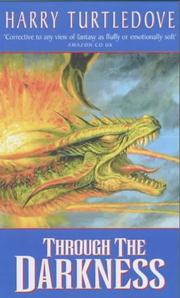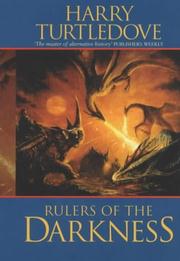 |

Through the Darkness
and
Rulers of the Darkness
by Harry Turtledove
(Through the Darkness: Earthlight, £6.99, 514 pages, paperback,
published 2002. Rulers of the Darkness: Earthlight, £6.99,
691 pages, paperback, published 6 October 2003.)
 The
continent of Derlavai is in tumult. Algarve is well on its way to establishing
a new empire, and having conquered Forthweg, Grelz, Valmiera and all
other neighbouring countries, it turns its eye to Unkerlant. Stalled
by the native resistance, the Algarvians have taken to slaughtering
Kaunians, the continent's former imperialists and current scapegoats,
to fuel the destructive magic they need to press onwards. While the
Unkerlanters, driven by the insane King Swemmel, defend their land against
the Algarvian army, the denizens of the outlying countries and islands
play both ends against the middle. Global war, and global devastation,
seems inevitable; but in a southerly island nation, work is underway
on the spell that could provide the ultimate deterrent -- or destroy
the world. The
continent of Derlavai is in tumult. Algarve is well on its way to establishing
a new empire, and having conquered Forthweg, Grelz, Valmiera and all
other neighbouring countries, it turns its eye to Unkerlant. Stalled
by the native resistance, the Algarvians have taken to slaughtering
Kaunians, the continent's former imperialists and current scapegoats,
to fuel the destructive magic they need to press onwards. While the
Unkerlanters, driven by the insane King Swemmel, defend their land against
the Algarvian army, the denizens of the outlying countries and islands
play both ends against the middle. Global war, and global devastation,
seems inevitable; but in a southerly island nation, work is underway
on the spell that could provide the ultimate deterrent -- or destroy
the world.
In other words, as the back cover blurb for Rulers makes overly
explicit, it's the Second World War in Fantasyland.
Like the Worldwar and Colonisation series before it,
the Darkness series is not so much a genre work as a military
romance with genre trappings. The key fantastic element here is that,
instead of mechanical guns and artillery, the various proponents use
explosive bursts of magic; so, for rifles the soldiers carry enchanted
sticks, and in place of grenades they throw ensorcelled eggs. I feel
this works a lot better as a basic concept than did the central premise
of Worldwar and Colonisation -- reptilian aliens invade
the Earth during the First World War, but in order to maintain enough
of a stalemate to sustain several very large books, their military technology
(several decades behind the propulsion technology that has given them
interplanetary travel) can only extend to percussive weaponry. Here
at least the fantastic concept is universally applied, and this does
wonders for the fiction's cohesion and believability.
I'm not sure, however, what to make of a book whose author feels it
necessary to provide six pages of "Dramatis Personae". The obvious implication
is that I'll forget who they all are unless I'm reminded, but is this
because as characters they're forgettable, or because there's just too
damned many of them? In truth it's a bit of both. The multiplicity of
viewpoint characters in the Darkness novels, as in other Turtledove
sagas, is their strength and their weakness: rather than the more partisan
picture one might get from a story with only one or two narrative voices,
these books offer the reader an all-round composite image of the situation
through the eyes of officers, footsoldiers and civilians of each culture
involved; however, this admirable effort to present "the whole picture"
is offset somewhat by the resultant narrative inconsistency. Turtledove
hasn't pared down his cast list to a handful of clear protagonists,
and so I found myself doing just that, as it were, on his behalf. Without
a doubt the most easily skimmed sections are those that feature the
manoeuvres of the  various
armies. Another ambush, another dragon-back bombing run. Oh, another
skirmish. Another village invaded. Another ambush. Very quickly the
assaults and retreats become repetitive, and the soldiers indistinguishable,
and this is quite a failing in a saga whose primary focus is the War. various
armies. Another ambush, another dragon-back bombing run. Oh, another
skirmish. Another village invaded. Another ambush. Very quickly the
assaults and retreats become repetitive, and the soldiers indistinguishable,
and this is quite a failing in a saga whose primary focus is the War.
These military to-ings and fro-ings comprise easily half of the story,
possibly even two thirds. That's 250 to 350 pages in Through,
no lightweight at 514 pages in total. Rulers adds another 150
on top of that, of which as many as 100 are skirmish, ambush, skirmish.
Reader, I hurried it.
The real interest, as far as I'm concerned, is in the lives of the
Forthwegian who cohabits with a Kaunian, the Valmieran noblewoman who
sleeps with the enemy, and the Kuusaman mages who are developing the
A-bomb of sorcery. Even here, though, there's too much repetition, and
I'm a little disturbed to note that I might reasonably have read only
the first three chapters and the last three chapters of Through
and intuited the entire remainder of the novel. I confess that, halfway
through Rulers, I skipped ahead and did just that. And these
are Books 3 and 4 in the series. Books 1 and 2, amounting to a further
1200 pages, are, I'm told, essentially backstory for this pair of books
in which very little changes. There's more to come.
What I'm trying to say, in a suitably long-winded way, is that Turtledove
overwrites. I realise it wouldn't please his fans, his publishers or
his accountant nearly so much, but it wouldn't be to the Darkness
saga's detriment to lose a good three quarters of its weight.
It's annoying, because Through and Rulers aren't badly
written. They're formulaically written, but they're certainly not badly
written. I genuinely wanted to find out what happened to some of the
characters -- not much, as it turned out, but I wanted to find that
out. But if anyone's offering to produce a set of York Notes on this
epic fantasy saga, I'd much rather read that next time.

Review by John Toon.
|
 |



